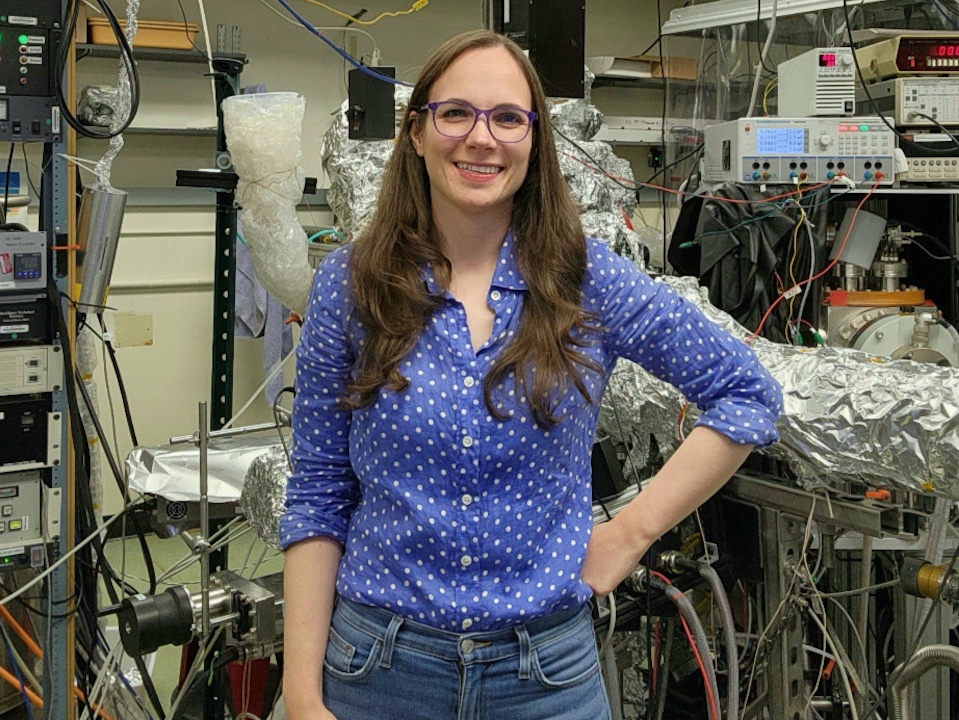Alice Kunin Joins Princeton Chemistry Faculty
The Department of Chemistry is pleased to welcome Alice Kunin as assistant professor of chemistry.
Kunin joins Princeton’s faculty from her position as a senior postdoctoral associate at Stony Brook University. She will open her lab at Princeton Chemistry in the Spectroscopy/Physical Chemistry subfield with a focus on developing novel spectroscopic approaches that combine surface-sensitive techniques with advanced laser methodologies to probe the ultrafast dynamics of optically excited states in materials.

Assistant Professor of Chemistry Alice Kunin.
“When I was at Princeton for the initial interview and visit it really just felt like it was a fit,” said Kunin. “Everywhere else I went, that just got reinforced. I am overwhelmed and excited that the faculty had the same feeling.
“Princeton Chemistry seems like the right place where I can bring something new to the Department, fill in areas that aren’t really being worked on right now, and complement existing research. I am excited to be surrounded by colleagues who are all pushing the forefront of their fields.”
Kunin’s post was formally approved by the University Board of Trustees in a vote last week. She will start in January of 2024.
The Kunin Lab will develop and apply state-of-the-art spectroscopic tools to access and characterize the ultrafast dynamics of optically excited states in different types of energy materials and also at interfaces and at surfaces. These include systems like novel quantum materials, photovoltaic materials, organic/inorganic interfaces for electronics, and photocatalytic reactions at surfaces for renewable energy applications.
“In general, there are a lot of outstanding questions that surround the details of how charge and energy transfer processes in these materials work at the molecular or electronic level, and importantly, why a given system or process doesn’t work as efficiently as we’d like it to for things like renewable energy applications,” said Kunin. “That’s been limiting in being able to harness these materials for their potential technologies. A lot of that limit comes from the technical difficulty in being able to spectroscopically resolve the details.
“That’s where my research comes in: pushing the state-of-the-art in terms of enabling these types of exquisitely detailed measurements through technique development and custom equipment.”
Kunin’s start in January 2024 gives her a window in the fall to work on designs and arrange for the long-lead and “big-ticket” items she’ll need to get the Kunin Lab up and running.
In the Spectroscopy/Physical Chemistry subfield, Kunin joins Robert Cava, the Russell Wellman Moore Professor of Chemistry; Assistant Professor William Jacobs; Herschel Rabitz, the Charles Phelps Smyth ’16 *17 Professor of Chemistry; Gregory Scholes, the William S. Tod Professor of Chemistry; Associate Professor Leslie Schoop; Annabella Selloni, the David B. Jones Professor of Chemistry; Assistant Professor Marissa Weichman; and Professor of Chemistry Haw Yang.
Kunin graduated with a B.S. in chemistry with a minor in mathematics from the University of Maryland, College Park in 2014. In 2019, she earned her Ph.D. at the University of California, Berkeley under Daniel Neumark, where she worked on probing excited state dynamics in molecular anions with ultrafast spectroscopy.
She completed her postdoctoral work with the Allison Lab at Stony Brook University.
Kunin was awarded a Department of Defense, National Defense Science and Engineering Graduate Fellowship at Berkeley, and was also recognized with the Outstanding Graduate Student Instructor Award at Berkeley for teaching.
She grew up in Maryland, the daughter of parents—both computer scientists—who emigrated from Ukraine in the late 1980s. When she started college, Kunin was a neurobiology major but soon switched to physical chemistry.
“I immediately fell in love with spectroscopy and the idea that you could assign or disentangle a complicated spectral measurement and get out all of the important chemical details,” she said. “It’s just like solving a puzzle. That’s when I started doing work in high-resolution spectroscopy at Maryland. I’ve been a spectroscopist ever since.”
Kunin is an avid hiker and reader, and during the pandemic lockdown took up crocheting.
